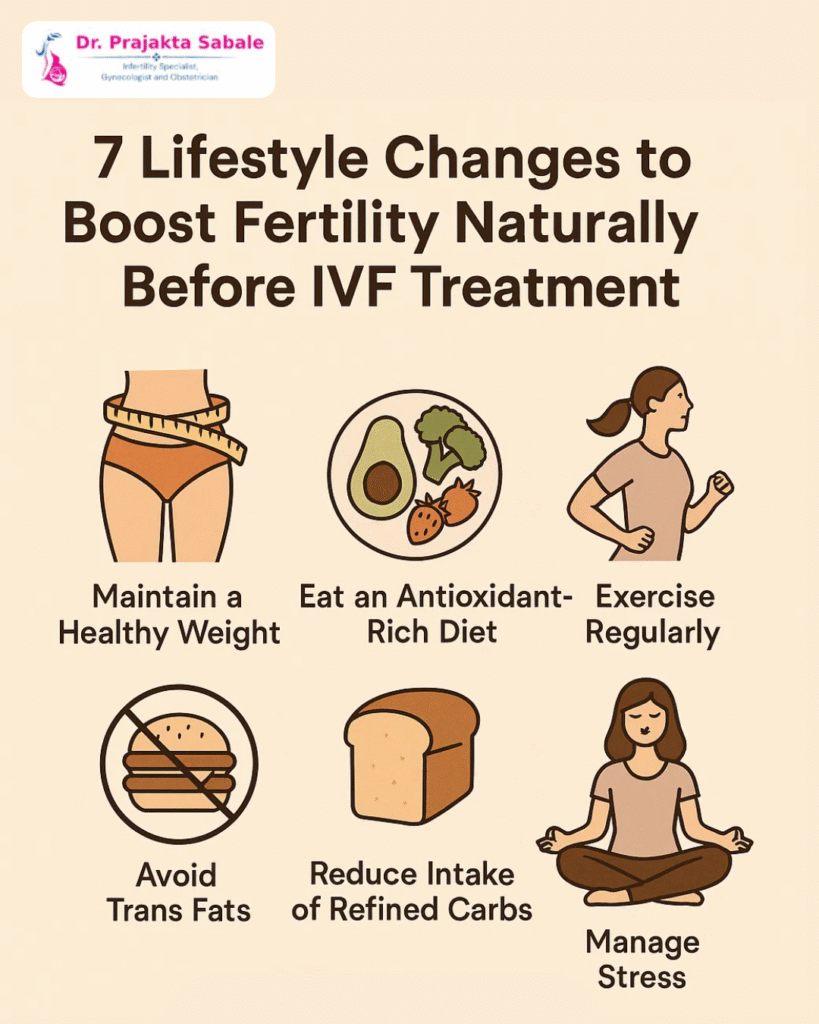If you’re planning to undergo IVF treatment, preparing your body with healthy lifestyle choices can make a big difference. While modern fertility treatments are highly advanced, your body still plays a key role in the success of the process. Making small but effective changes to your daily habits can help boost fertility naturally and improve your chances of a successful IVF cycle. IVF treatment should always begin under the guidance of an experienced gynecologist. If you’re seeking IVF treatment in Hinjewadi, consult Dr. Prajakta Sabale for accurate diagnosis and result-oriented care tailored to your needs.
Here are 7 expert-recommended lifestyle changes to adopt before starting IVF
1. Maintain a Healthy Weight
Being either overweight or underweight can affect hormone levels and ovulation. Women with a Body Mass Index (BMI) between 18.5 and 24.9 are more likely to conceive naturally and respond better to fertility treatments. Regular exercise and a balanced diet can help manage your weight effectively.
2. Eat a Fertility-Friendly Diet
Focus on whole foods rich in antioxidants, fiber, vitamins, and healthy fats. Include:
- Leafy greens
- Whole grains
- Nuts and seeds
- Berries
- Lean proteins (chicken, fish, eggs)
- Full-fat dairy in moderation Avoid processed foods, excess sugar, and trans fats as they can negatively impact hormone balance.
3. Limit Caffeine and Alcohol
High caffeine and alcohol intake have been linked to reduced fertility. Limit caffeine to no more than 200 mg per day (about one 12-oz cup of coffee), and avoid alcohol altogether while trying to conceive and during IVF cycles.
4. Quit Smoking and Avoid Toxins
Smoking affects egg and sperm quality and can reduce the success of IVF. Exposure to environmental toxins, pesticides, and chemicals (like in plastics and cosmetics) may also harm fertility. Choose organic foods when possible and use natural personal care products.
5. Manage Stress Effectively
Trying to conceive can be emotionally challenging, especially if you’ve been trying for a long time. Chronic stress can affect hormone levels and ovulation. Practice relaxation techniques like:
- Yoga
- Meditation
- Deep breathing exercises
- Talking to a counselor or support group
6. Get Quality Sleep
Sleep is essential for hormone regulation. Aim for 7–9 hours of uninterrupted sleep every night. Poor sleep can disrupt ovulation and reduce IVF success rates. Maintain a consistent sleep schedule and create a relaxing bedtime routine.
7. Take Prenatal and Fertility Supplements
Start taking prenatal vitamins with folic acid, iron, and vitamin D at least 3 months before IVF. Your doctor may also recommend CoQ10, omega-3, or other fertility-supporting supplements depending on your individual needs.
Final Thoughts from Dr. Prajakta Sabale – IVF Specialist in Hinjewadi
“Before beginning IVF, it’s important to prepare your body and mind for the journey ahead. Simple lifestyle changes can significantly increase your chances of success. Every couple’s path to parenthood is unique, so consult your fertility specialist for a personalized plan,” says Dr. Prajakta Sabale, IVF & Fertility Specialist in Hinjewadi.
If you’re planning IVF or facing fertility challenges, schedule a consultation today. Let’s take the first step toward your dream of parenthood—together.

